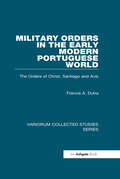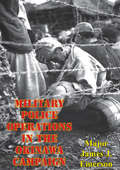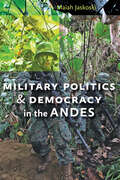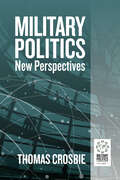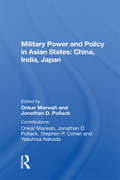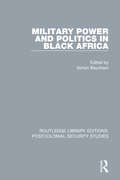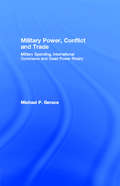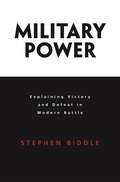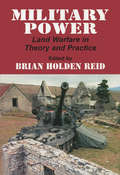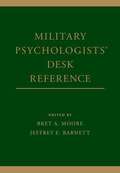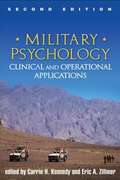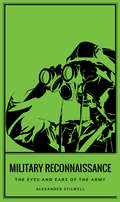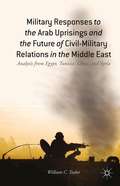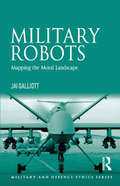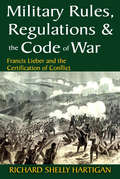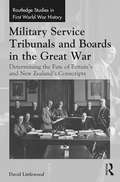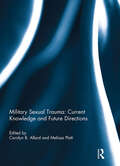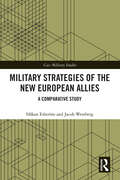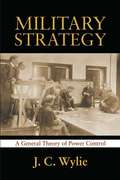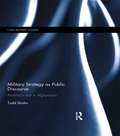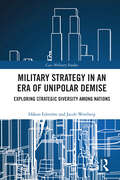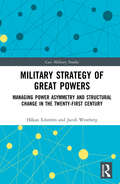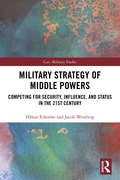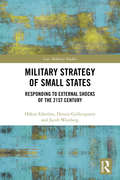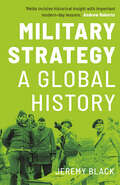- Table View
- List View
Military Orders in the Early Modern Portuguese World: The Orders of Christ, Santiago and Avis (Variorum Collected Studies)
by Francis A. DutraDuring the sixteenth, seventeenth, and eighteenth centuries, the three Portuguese military orders of Christ, Santiago and Avis became that kingdom's most important institutions for rewarding services to the Crown. Membership in these military orders was highly prized as status symbols and because of the orders' "purity of blood" statutes, these knighthoods were more highly esteemed than mere patents of nobility, especially since such knighthoods automatically ennobled. Francis A. Dutra has written widely on the Portuguese military orders of Christ, Santiago and Avis - a topic generally neglected by students of early modern Portugal. This volume brings together a selection of his pioneering essays. Based extensively on archival research, they reflect his special interest in social mobility and use of the knighthoods for patronage, while particular sections focus on the role of the orders in the Portuguese maritime expansion and in India and Brazil, and on the medical profession. The collection includes English translations of four studies that originally appeared in Portuguese, as well as a detailed index, in itself a useful research tool.
Military Police Operations In The Okinawa Campaign
by Major James J. Emerson USMCDuring the World War II campaign to seize the island of Okinawa, Operation Iceberg, U.S. Tenth Army employed a significant U.S. Army and U.S. Marine Corps military police structure. However, the challenges posed to these units by military traffic, nearly 300,000 enemy civilians, and over 10,000 prisoners of war are issues largely neglected by historians.This study analyzes the overall effectiveness and value of the largest joint military police operation in the Pacific theater. It evaluates military police force structure and operations by assessing pre-campaign planning and results of operations with extant historical doctrine, operational setting, and historical information.Historical military police doctrine is discussed to identify standards which existed in 1945. Intelligence or other information about the operational environment is examined for relevance to doctrine. Finally, historical accounts or information about military police operations are contrasted with doctrine and operational setting.Historical information is assessed within five mission areas; traffic control operations, prisoner of war operations, civilian handling operations, security operations, and law and order operations. Within these mission areas information is further organized by unit, time, and relation to the tactical situation. Detailed assessment and evaluation reveal Tenth Array military police overall effectiveness and value in Operation Iceberg.
Military Politics and Democracy in the Andes
by Maiah JaskoskiInterviews with active-duty and retired military officers in Ecuador and Peru shed light on the evolution of Andean civil-military relations, with implications for democratization.Military Politics and Democracy in the Andes challenges conventional theories regarding military behavior in post-transition democracies. Through a deeply researched comparative analysis of the Ecuadorian and Peruvian armies, Maiah Jaskoski argues that militaries are concerned more with the predictability of their missions than with sovereignty objectives set by democratically elected leaders. Jaskoski gathers data from interviews with public officials, private sector representatives, journalists, and more than 160 Peruvian and Ecuadorian officers from all branches of the military. The results are surprising. Ecuador’s army, for example, fearing the uncertainty of border defense against insurgent encroachment in the north, neglected this duty, thereby sacrificing the state’s security goals, acting against government orders, and challenging democratic consolidation. Instead of defending the border, the army has opted to carry out policing functions within Ecuador, such as combating the drug trade. Additionally, by ignoring its duty to defend sovereignty, the army is available to contract out its policing services to paying, private companies that, relative to the public, benefit disproportionately from army security. Jaskoski also looks briefly at this theory's implications for military responsiveness to government orders in democratic Bolivia, Colombia, and Venezuela, and in newly formed democracies more broadly.
Military Politics: New Perspectives (Military Politics #1)
by Thomas CrosbieBringing together new research by leading scholars, this volume rethinks the role played by militaries in politics. It introduces new theories of military politics, arguing against the inherited theories and practices of civil-military relations, and presents rich new data on senior officership and on the intersection of military politics and military operations. As the first volume in Berghahn Books’ Military Politics series, it provides a blueprint for a new research paradigm dedicated to tracing how militaries shape their political environments, focusing particularly on the core democratic questions raised by politically-effective (and ineffective) militaries.
Military Power And Policy In Asian States: China, India, Japan (Westview Special Studies On South And Southeast Asia)
by Onkar MarwahThis study challenges the belief that the security concerns and strategic objectives of lesser states are dependent on the dominant power alliances and on assessments by major powers of the prospects for peace or war. Focusing on the views of security and military power adopted by elites in China, India, and Japan, the contributors point out that e
Military Power and Politics in Black Africa
by Simon BaynhamFirst published in 1986, Military Power and Politics in Black Africa explores many themes that concerned military power and politics in sub-Saharan Africa at the time of publication. Adopting a thematic approach, the book considers the nature of both intervention and disengagement and looks at the relationship between civilian and military institutions. The final chapters put forward arguments for the importance of foreign intervention in the politics and civil-military relations of African states.
Military Power, Conflict and Trade: Military Spending, International Commerce and Great Power Rivalry
by Michael P. GeraceWherever international commerce flows in world politics, military power often flows with it - sometimes as a protector of commerce, sometimes as its promoters and sometimes as a tool of aggression against it. How are military power and international trade related? Do military power and commerce expand together or does military power decline as commerce (and perhaps interdependence) increases? Does this relationship vary across countries and, if so how? Power, Conflict and Trade is a study of the relationship between military power and international commerce among the Great Powers prior to World War I.After building an argument for a direct relationship between military power and commerce - one grounded in a mercantilist view of state power- and exploring their numerous connections, the book estimates models of the relationship among the Great Powers and explores a great deal of their commercial and military data, all of which is situated in the context of their mutual rivalries. Another question investigated is whether the peacetime conflicts and rivalries of the Great Powers affected their trade relations adversely. There is strong support for the argument that military power and commerce move together in world politics, though there is evidence for an inverse relationship as well.
Military Power: Explaining Victory and Defeat in Modern Battle
by Stephen BiddleIn war, do mass and materiel matter most? Will states with the largest, best equipped, information-technology-rich militaries invariably win? The prevailing answer today among both scholars and policymakers is yes. But this is to overlook force employment, or the doctrine and tactics by which materiel is actually used. In a landmark reconception of battle and war, this book provides a systematic account of how force employment interacts with materiel to produce real combat outcomes. Stephen Biddle argues that force employment is central to modern war, becoming increasingly important since 1900 as the key to surviving ever more lethal weaponry. Technological change produces opposite effects depending on how forces are employed; to focus only on materiel is thus to risk major error--with serious consequences for both policy and scholarship. In clear, fluent prose, Biddle provides a systematic account of force employment's role and shows how this account holds up under rigorous, multimethod testing. The results challenge a wide variety of standard views, from current expectations for a revolution in military affairs to mainstream scholarship in international relations and orthodox interpretations of modern military history. Military Power will have a resounding impact on both scholarship in the field and on policy debates over the future of warfare, the size of the military, and the makeup of the defense budget.
Military Power: Land Warfare in Theory and Practice
by Brian Holden ReidThe contributors here consider the multifarious aspects of the Anglo-American approach to war. All the contributors are concerned to base their work on the overall historical context. They explore the relationship between theory and practice in military operations.
Military Psychologists' Desk Reference
by Bret A. Moore Jeffrey E. BarnettMilitary Psychologists' Desk Reference is the authoritative guide in the field of military mental health, covering in a clear and concise manner the depth and breadth of this expanding area at a pivotal and relevant time.
Military Psychology, Second Edition
by Eric A. Zillmer Carrie KennedyWidely regarded as the authoritative reference in the field, this book comprehensively explores the psychological needs of today's service members and how to meet them effectively. Expert contributors review best practices for conducting fitness-for-duty evaluations and other types of assessments, treating frequently encountered clinical problems, responding to disasters, and promoting the health and well-being of all personnel. The book also examines the role of mental health professionals in enhancing operational readiness, with chapters on crisis and hostage negotiation, understanding terrorists, and more. New to This Edition The latest scientific knowledge, clinical interventions, and training recommendations. Chapter on acute combat stress. Chapter on post-deployment problems, including PTSD and depression. Chapter on military psychology ethics. Coverage of blast concussion screening and evaluation.
Military Reconnaissance: The Eyes and Ears of the Army (Casemate Short History)
by Alexander StilwellThis concise history chronicles the role of military recon, from the ancient warfare of Greeks and Romans to the operations of modern scout snipers. Since the earliest recorded military history, scouting and reconnaissance have been key tools for military commanders in order to make tactical decisions. As military strategy, weapons, and equipment developed over the centuries, methods of scouting and reconnaissance evolved as well but were never discarded. This short history paints a revealing picture of the art of military scouting and reconnaissance. From the secret sciritae of the Spartans and the scouts employed by Julius Caesar to the Middle Ages, Napoleonic Wars, and modern era of scout snipers and special forces units, this volume covers the evolution of recon operations across centuries of conflict.
Military Responses to the Arab Uprisings and the Future of Civil-Military Relations in the Middle East
by William C. TaylorThis book explains Arab military responses to the social uprisings which began in 2011. Through a comparative case study analysis of Egyptian, Tunisian, Libyan, and Syrian militaries, it explains why militaries fractured, supported the regime in power, or removed their presidents.
Military Robots: Mapping the Moral Landscape (Military and Defence Ethics)
by Jai GalliottPhilosophers have wrestled over the morality and ethics of war for nearly as long as human beings have been waging it. The death and destruction that unmanned warfare entails magnifies the moral and ethical challenges we face in conventional warfare and everyday society. Intrinsically linked are questions and perennial problems concerning what justifies the initial resort to war, who may be legitimately targeted in warfare, who should be permitted to serve the military, the collateral effects of military weaponry and the methods of determining and dealing with violations of the laws of war. This book provides a comprehensive and unifying analysis of the moral, political and social questions concerning the rise of drone warfare.
Military Rules, Regulations and the Code of War: Francis Lieber and the Certification of Conflict
by Richard Shelly HartiganMilitary commanders from ancient time had set down rules and regulations to discipline their troops. From the Pharaohs on, commanders directed the strategy, tactics, and camp discipline of the often unruly hosts of soldiers under their command. They had one aim: to create an efficient fighting force. Military officers, camp-followers and cooks were all expected to perform their services according to mandate and in light of the best interests of the armed force and the fighting soldiery. Modern commanders have exemplified the same passion for military discipline to produce an effective combat machine. Military analyses derived from Roman law contained enough historical examples to fill an encyclopedia. Yet, although addressed to the problems of their day, they generally remained the private counsel of scholars and had little impact on political and military decisions. While theorists of international law were developing a body of rules to govern warfare, practitioners of conflict were largely moved by the motives of military necessity. Under the dual auspices of military necessity and national self-interest, the code of the military commander was simple: maintain a disciplined fighting force in order to achieve military victory. To remedy this gap between theory and practice, a practical guide was needed which would briefly describe for commanders in the field their rights and obligations of belligerents as custom and theory had developed them. Then political and military policy could be expected to conform to the theoretical law of nations. This was the synthesis that the Lieber code proposed. Originally published in as Lieber's Law and the Code of War, this paperback edition bears a new title that more precisely identifies the subjects covered.
Military Service Tribunals and Boards in the Great War: Determining the Fate of Britain’s and New Zealand’s Conscripts (Routledge Studies in First World War History)
by David LittlewoodWhile a plethora of studies have discussed why so many men decided to volunteer for the army during the Great War, the experiences of those who were called up under conscription have received relatively little scrutiny. Even when the implementation of the respective Military Service Acts has been investigated, scholars have usually focused on only the distinct minority of those eligible who expressed conscientious objections. It is rare to see equal significance placed on the fact that substantial numbers of men appealed, or were appealed for, on the grounds that their domestic, business, or occupational circumstances meant they should not be expected to serve. David Littlewood analyses the processes undergone by these men, and the workings of the bodies charged with assessing their cases, through a sustained transnational comparison of the British and New Zealand contexts.
Military Sexual Trauma Current Knowledge and Future Directions
by Carolyn B. Allard Melissa PlattMilitary Sexual Trauma: Current Knowledge and Future Directions showcases the work of several prominent military sexual trauma (MST) researchers, scholars, and clinicians from across the United States. A review of existing research and original empirical findings converge to indicate that MST contributes to a range of physical health problems, complex posttraumatic responses, and other mental health consequences above and beyond the effects of other types of traumatic experiences. This collection also presents evidence suggesting that MST is often difficult to identify both within the individual military member and within the military population as a whole. Recommendations are offered for addressing this problem. In addition to the research review and empirical findings, an evolutionary framework for understanding sexual assault of women in the military is presented. Taken together, this collection of works may inform MST intervention and prevention efforts. This book was originally published as a special issue of Journal of Trauma & Dissociation.
Military Strategies of the New European Allies: A Comparative Study (Cass Military Studies)
by Håkan Edström Jacob WestbergThis book analyses how and to what extent ex-communist states have adjusted their defence strategies since joining the EU and NATO, and how differences and similarities between their strategies can be explained. Between 1999 and 2013, four phases of enlargement took place when the European Union (EU) and NATO allowed 11 new former communist states to enter both organisations. These states share some common attributes and experiences related to strategic culture and common experiences during the Cold War era that can potentially explain similarities in behaviour and preferences among them. However, the strategic adjustments among these states are far from uniform. In an effort to explain these differences, the book introduces three intervening variables: (1) differences in relative power and position in the international system, (2) national geographical characteristics; and (3) historical experiences related to formative periods of state-building processes as well as wars and armed conflicts. Empirically, the book strives to present and analyse the defence strategies of each of the new allies by conducting a structured focused comparison of official strategic documents from the twenty-first century for each of the 11 cases. Theoretically and methodologically, it introduces an analytical framework enabling us to explain both similarities and differences in the formulation of the strategies of the 11 states, and to shed light on their external and internal efforts to promote their strategic interest by operationalising the dependent variable - defence strategy. The analytical framework combines elements of structural realism with classical realism, and constructivist research on unit-level characteristics related to relative power and perceptions of strategic exposure. This book will be of much interest to students of strategic studies, European Union policy, NATO and International Relations in general.
Military Strategy
by Joseph Caldwell Wylie Jr"No military service can long remain effective without searching self-criticism and continuous re-examination of its own ideas. Wylie, well known in the Navy, is a refreshingly and outspoken individual, thoroughly at home on the bridge of a ship, but equally at home in the semantics of dialectical discussion. He has produced a simple but relevant little work in an attempt to promote order in the discussion of strategy. . . . To the traditional theories of strategy-the maritime theory, the air theory, the continental theory-Wylie adds the 'Mao theory' of wars of national liberation. . . . [This book is] easier to read and understand and basically sounder than the great majority of the involved and tortuous rationalizations of the academic strategists."- New York Times Book Review
Military Strategy as Public Discourse: America's war in Afghanistan (Cass Military Studies)
by Tadd SholtisThis book presents the current history of United States military strategy in Afghanistan as an example of dysfunctional policy discourse among the nation’s elites. The legitimacy of a country’s military strategy can become a subject of intense public debate and doubt, especially in prolonged conflicts. Arguments typically hinge on disagreements about the values at stake, the consequences of action or inaction, and the authority of those responsible for the plan. As the US entered its second decade at war in Afghanistan, political and military leaders struggled to explain the ends and means of their strategy through internal policy debates, the promotion of counterinsurgency doctrine, and day-to-day accounts of the war’s progress. Military Strategy as Public Discourse considers recent US strategy in Afghanistan as a form of valid and equitable public discussion among those with the ability to affect outcomes. The work examines the dominant forms of discourse used by the various groups of elites who make and execute strategy, and considers how representations of these forms of discourse in news media shapes elite understanding of the purpose of US efforts in wars of choice. The book proposes how policy-makers should address the problems of public discourse on war, which tends to exclude or marginalize relevant elites and focus on narrow questions of validity. This book will be of much interest to students of strategic studies, US foreign policy, and security studies in general.
Military Strategy in an Era of Unipolar Demise: Exploring Strategic Diversity among Nations (Cass Military Studies)
by Håkan Edström Jacob WestbergThis book presents a systematic comparison of the military strategies pursued by five great powers, eight major middle powers and eight middle powers during the early twenty-first century.In addition to mapping the strategic priorities of these states, the study develops and applies a theoretical framework to explain differences and similarities in their strategic priorities. Moreover, the work evaluates how the stability of the present international system, and the US-led liberal international order (LIO), is affected by the strategies pursued by the US and other leading states. The book aims to contribute to previous research in three ways. First, it intervenes in the debate on the stability of the unipolar system and the US-led international order by offering a theoretical framework and an empirical approach for exploring and explaining the strategic priorities and defence strategies of different categories of states. Second, it aims to fill a void in research on strategy – the lack of a comparative and systematic approach to contemporary strategy that facilitates and guides systematic comparisons and analyses of the alignment and military strategies pursued by both major powers and less powerful states. Third, it provides an empirical contribution to the debate on the stability of the unipolar system and the US-led international order by presenting a documentation of the strategic priorities of 21 states based on primary sources, consisting of official documents such as national security and defence strategies and defence bills. In the conclusion, the authors summarise the empirical findings on the system level, the regional level and the unit level and present their overarching conclusions for the whole project.This book will be of much interest to students of military and strategic studies, defence studies, foreign policy and international relations in general.
Military Strategy of Great Powers: Managing Power Asymmetry and Structural Change in the 21st Century (Cass Military Studies)
by Håkan Edström Jacob WestbergThis book explores the military strategies of the five system-determining great powers during the twenty-first century. The book’s point of departure is that analyses of countries’ defence strategies should acknowledge that states come in various shapes and sizes and that their strategic choices are affected by their perceptions of their position in the international system and by power asymmetries between more and less resourceful states. This creates a diversity in strategies that is often overlooked in theoretically oriented analyses. The book examines how five major powers – the United States, China, the United Kingdom, France and Russia – have adjusted their strategies to improve or maintain their relative position and to manage power asymmetries during the twenty-first century. It also develops and applies an analytical framework for exploring and categorising the strategies pursued by the five major powers which combines elements of structural realism with research on power transition theory and status competition. The concluding chapter addresses questions related to stability and change in the present international system. This book will be of interest to students of strategic studies, foreign policy, and International Relations.
Military Strategy of Middle Powers: Competing for Security, Influence, and Status in the 21st Century (Cass Military Studies)
by Håkan Edström Jacob WestbergMilitary Strategy of Middle Powers explores to what degree twenty-first-century middle powers adjust their military strategies due to changes in the international order, such as the decline in US power. The overarching objective of the book is to explain continuity and change in the strategies of a group of middle powers during the twenty-first century. These strategies are described, compared, and explained through the lens of Realism. In order to find potential explanations for change or continuity within the cases, as well as for similarities and differences between the cases, the strategies of 11 ‘middle’ powers are analysed (Canada, Germany, Italy, Spain, Australia, Brazil, Indonesia, South Africa, India, Japan, and South Korea). This group of countries are considered similar in several important aspects, primarily regarding relative power capacity. When searching for potential explanations for different strategic behaviours among the middle powers, their unique regional characteristics are a key focus and, consequently, the impact of the structure and polarity, as well as the patterns of amity and enmity, of the regional context are analysed. The empirical investigation is focused on security strategies used since the terrorist attacks 9/11 2001, which was one of the first major challenges to US hegemony. This book will be of much interest to students of military and strategic studies, foreign policy, and International Relations in general.
Military Strategy of Small States: Responding to External Shocks of the 21st Century (Cass Military Studies)
by Håkan Edström Dennis Gyllensporre Jacob WestbergThe book explores how small states adjust their military strategies in response to external shocks. Using primary sources from four Nordic countries, (Denmark, Finland, Norway, and Sweden), this volume explores how small states have adjusted their military strategies in response to external shocks of the 21st century. The 9/11 terrorist attacks, the Russian interventions in Georgia and Ukraine, and the rise of the Islamic State have all forced the Nordic states to adopt new strategies. While the responses have not been uniform, their differing relations to the EU and NATO have not prevented these countries from behaving similarly in military affairs. Limitations in military capacity has led all four countries to pursue strategies that include cooperation with more resourceful partners. It is necessary for them to cooperate with others to protect and promote their national interests. Moreover, the Nordic cosmopolitan outlook expresses milieu-shaping ambitions that we generally would not expect small states to pursue against a potential great power aggressor. This book will be of much interest to students of military strategy, defense studies, security studies, and international relations.
Military Strategy: A Global History
by Jeremy BlackA global account of military strategy, which examines the practices, rather than the theories, of the most significant military figures of the past 400 years Strategy has existed as long as there has been organised conflict. In this new account, Jeremy Black explores the ever-changing relationship between purpose, force, implementation and effectiveness in military strategy and its dramatic impact on the development of the global power system. Taking a &‘total&’ view of strategy, Black looks at leading powers — notably the United States, China, Britain and Russia — in the wider context of their competition and their domestic and international strengths. Ranging from France&’s Ancien Regime and Britain&’s empire building to present day conflicts in the Middle East, Black devotes particular attention to the strategic practice and decisions of the Kangxi Emperor, Clausewitz, Napoleon and Hitler.
